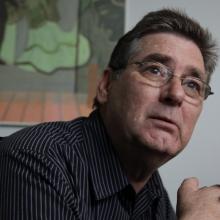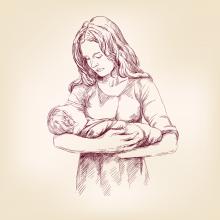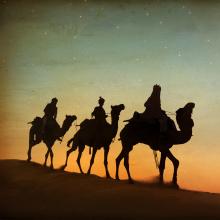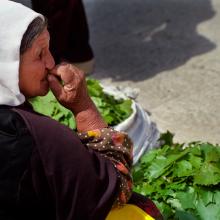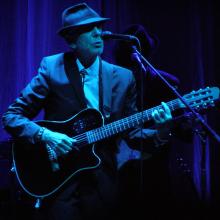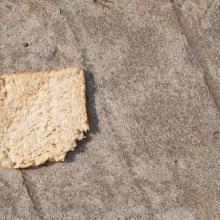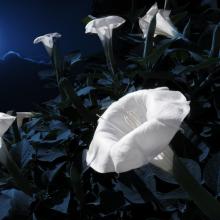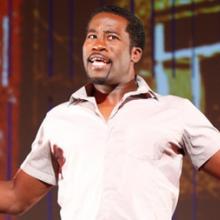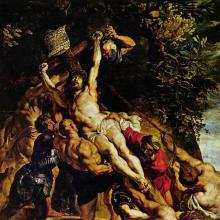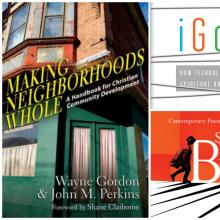Poetry
When it comes to living small,
you were ahead of your time,
which is why I nominate you
patron saint of tiny homes. So
you haven’t heard of them?
POET BRUCE WEIGL inhabits two places in his life, in his work. Two places that could not be more different. But in the course of our conversations, I come to think of them as a single place, the way two hands are part of a single body. One place is Lorain, Ohio. The other is Vietnam.
Ever since the Vietnam War ended, the life of this mill worker’s son has swung between those two far-flung poles.
I met Weigl at a Starbucks in Manhattan’s East Village. I was interviewing a friend of his, Adrie Kusserow, about her book of poems on South Sudan. Weigl was content just to drink his coffee and listen to us talk. He intervened only once, when Kusserow and I began decrying public indifference to South Sudan’s pre-independence history of slaughter, enslavement, and banishment by Sudan.
“If I may defend my fellow human beings here, there are so many places in the world today where there is suffering. It is understandable that people may miss one or two,” he said.
The suffering of the Vietnamese, and of soldiers like himself who fought in Vietnam, is still burned into his psyche like some gory tattoo. It is to be found in every one of his 13 books.
I.
The wailing and the murmured prayers,
the animal ruckus, and coin against coin,
smoke hanging in the temple spaces—
offerings that bear our love to the seat of heaven.
For sixty years my soul has leaned
so hard toward the Almighty, I’m open
like a flower drenched with light
that blossoms into words.
Wizards! Caspar! Melchior! Balthasar!
Why fly straight to Fox Herod? Through
Unbounded night—! Bringing only news
Ripe for bloodletting. How black a star
You follow. Herod knows. How bizarre
A kingly claim. Will he oppose? Muse
Like Mary? Ha—! Mothers’ sons lose
Heads to swords & axes. Herod bars
The throne to Jesus. Who kills first?
Ryan Herring reads Langston Hughes' "Harlem" as photos of Ferguson are displayed.
Boys on a beach,
women with cookpots,
men bombing tender patches of mint.
There is no righteous position.
Only a place where brown feet
touch the earth.
Maybe you call it yours.
Maybe someone else runs it.
What do you prefer?
On September 21, Leonard Cohen Turned 80. With or Without a Cigarette, It’s Time to Celebrate.
“I hope I stay on the road a little bit longer - but you may not be so enthusiastic when you hear my reason. You see I want to start smoking next year when I'll be 80. It's been a long barren time. I think it’s the right age to recommence.” —Leonard Cohen
I dreamed you were in Florence, singing on some stage. Your back was to the men, the women by your sides. Your melody was tranquil, just humming do-re-me-fa, la-fa-re-me-do. And when there was commotion, some men quarreling behind the scene, you turned and faced them calmly, beseeching, “Gentlemen, let’s sing.”
You have left us these past months, ceased your universal tour. It gives us time to miss you, and wonder what you mean. This week you will be eighty, there’s no question, you are old. Your bones may creak or ache and I’ll guess your heart’s a little tired, but from outside looking in you seem settled in a pretty gentle space.
So in the dream your melodies kept coming, like a river from its source. “You’re doing it,” someone shouted. “It’s exactly what we want!” People were casually swaying until your voice started to get hoarse. “Well, I’m glad you like it,” you croaked joyfully, “I call this solemn mingling my little Florentine Prayer.”
the young rabbi, earnest and intense,
forgot to read your requested scripture passage
then, a shovel had to be asked for,
so each of us could cover you
with three mounds of warm earth
your daughter fussed a little but later went for shiva at the house
the sermon was almost too simple:
the greatest good deed is to bury the dead
The first time we visited my sister in her monastery
Was just after one of our sons had survived massive
Surgeries, before and during which all the monks &
Nuns in the monastery, not to mention thousands of
Other generous souls, had prayed constantly for him
And it turned out that they had gone over the million
Prayer mark for our son, which, according to the law
Of the monastery, gave him lifetime privileges. He’s
No dolt, this kid, and he took off running, to hammer
On drums, and eat the cookies on an altar, and pursue
The grim local peacocks, who were deeply aggrieved.
Daneil Beaty performs “Knock Knock,” a powerful poem that tells the story of his father’s incarceration.
On the monastery walk,
in the clear daylight after
the night of heavy rain,
I consider the moonflower:
how the big spent blooms look like
three linen tea towels rinsed and wrung out,
three yellowed towels someone meant to
pin to the line to dry.
“I AM A storyteller,” says Daniel Beaty, “and my purpose in the world is to inspire people to transform pain to power.”
He was first inspired to share his stories when his third-grade teacher showed a videotape of Martin Luther King Jr.’s “I Have a Dream” speech. Now as a writer, actor, singer, teacher, and motivational speaker, his storytelling is expressed in a dizzying array of different forms and outlets. The week in April that Sojourners’ editorial assistant Rebecca Kraybill interviewed him, Beaty was doing daily performances in Los Angeles of a one-person play he wrote on the life of performer and activist Paul Robeson, “The Tallest Tree in the Forest” (in which he plays 40 characters and sings 14 songs) and, during the day, taping for a Ford Foundation-funded documentary on work he does with children of incarcerated parents.
This was just a fortnight after Beaty finished a six-week speaking tour in support of his memoir, Transforming Pain to Power: Unlock Your Unlimited Potential (Penguin-Random House). He’s also the author of a children’s book released in December 2013 by Little, Brown and Company, Knock Knock: My Dad’s Dream for Me, with graphics by award-winning illustrator Bryan Collier, which is an adaptation of a poem Beaty wrote about his experience growing up with an incarcerated father. “Knock knock down the doors that I could not” is one especially poignant line the father in the book writes to the son; it carries a call to healing and liberation that is found in all of Beaty’s work.
Kraybill talked with Beaty about the effects of mass incarceration on families, the power of a “theater sanctuary,” and how the arts call us toward “the capacity to do better.”
The back-lit morning wave
Clarified emerald suddenly in olive,
Then gone; forever the cry of the Christ's torso
In Rubens' "Elevation of the Cross";
A glass pepper shaker filled to overflowing
By a finger of fallen sun at the close
Of a most mundane afternoon.
Obsessed is perhaps too strong a wod
From white villages Easter bells resound.
Rejoice! Give thanks! I raise my voice
Evil disappears from the world.
And that means somewhere God must be.
Everyday Saints
St. Peter’s B-List: Contemporary Poems Inspired by the Saints, edited by Mary Ann B. Miller, is not a collection of sentimental greeting-card-style verses; instead these literary works wrestle deeply with the human condition and the yearning for holiness, sometimes implicit, sometimes explicit. Ave Maria Press
City Missions
For nearly 30 years the Christian Community Development Association has been a resource for people seeking to do prophetic, non-paternalistic urban ministry. In Making Neighborhoods Whole: A Handbook for Christian Community Development, CCDA co-founders Wayne Gordon and John Perkins, and other veteran and emerging leaders, revisit key principles and lessons learned. IVP Books
IT IS FITTING that The Collected Poems of Denise Levertov (New Directions) begins with “Listening to Distant Guns,” written in 1940, when the poet was just 17: “The low pulsation in the east is war.”
The subject of war and its horrors, a constant in Levertov’s poetry and in her life, surfaces for the final time at the very end of this big book with these lines, written in 1997, from the poem “Thinking About Paul Celan”: You / at last could endure / no more. But we / live and live, / blithe in a world / where children kill children.
Denise Levertov (1923-1997), an American poet born in Ilford, England, to a Christian-Jewish father who was a descendant of Rabbi Schneur Zalman, founder of Chabad Hasidism, and a Welsh-Christian mother, herself the descendant of the Christian mystic Angell Jones of Mold, began to see her spiritual sensibility take a more formal religious shape only in her late 50s, when she opened to the liturgical, mystical, and social justice dimensions of Christianity, especially Catholicism, to which she later converted.
Two recent biographies, Dana Greene’s Denise Levertov: A Poet’s Lifeand Donna Krolik Hollenberg’s A Poet’s Revolution: The Life of Denise Levertov, explore deeply, albeit with inevitable overlap, the serial passions and enduring poetics of this singular artist.
At age 11, both biographers tell us, Levertov was going door to door peddling The Daily Worker in Ilford. At 12, she sent a batch of her poems to T.S. Eliot, and received back from him an encouraging response.
Poetry was her life’s purest passion. She had many lovers, many headlong, hurtful affairs to compensate for her romantically derailed and failed marriage to writer-activist Mitch Goodman. She also had a troubled relationship with their son, Nikolai, to whom Collected Poems is dedicated.

